Well, I’d love to go on and on about the recent Evangelicals for Social Action conference in Philly — what a joy to be with radical, activist, delightful Christians working for peace, justice, human rights and creation-care, and to honor our mentor and friend, Ron Sider. I guess you saw my review of the new book done in his honor, Following Jesus: Journeys in Radical Discipleship, as the last two BookNotes posts have been about it. We may be the only bookstore stocking it at this point, and we have it at the deeply discounted price of just $25.00. Seeing old friends and meeting new ones at the ESA 40th was a true joy. Selling good books to folks who are making a difference is a privilege. What an honor to resource and equip those working for a better world, loving neighbor with acts of mercy, doing justice for the common good, walking humbly with God.
But, we are unpacking the van today — Beth is one strong woman! — and repacking with even more books to head to our next gig, the staff training time of the Coalition for Christian Outreach (CCO) and then the Second Annual Hearts & Minds Pittsburgh Summer Lecture, hosted by the CCO. We are presenting our friend Dr. William Edgar of Westminster Seminary who will lecture on his new book about Francis Schaeffer, Schaeffer on the Christian Life: Countercultural Spirituality. (Crossway Books; $17.99 –on sale for $14.40.)
Here’s how we rather formally put it on the press release:
Hearts & Minds, an independent bookstore in Dallastown PA, will partner with the Coalition for Christian Outreach (CCO), a Pittsburgh-based campus ministry organization, to host a public lecture of scholar and author Dr. William Edgar, July 18th at 7:00 pm. The second annual Hearts & Minds Summer Lecture, will be held at the Sewall Center at Robert Morris University and is free and open to the public. The title of the lecture is “The Prophetic Voice: Insights from Francis Schaffer for Today.” It will be drawn from his recently released, highly-acclaimed study of Francis Schaeffer, Schaeffer on the Christian Life: Countercultural Spirituality. (Crossway Books; $17.99.)
THIS MATTERS TO US…
I have written in past BookNotes columns describing (okay, pushing!) my interest in a whole-life sort of discipleship that embodies a vision of the Kingdom of God that is best defined as “creation regained.” That is, all of life is being redeemed by Christ and being His disciples means we must be “non-conformed to the spirit of the age” but “think Christianly” about everything. Life is worship, as Romans 12:1-2 puts it. And that means all of life, since God is redeeming the whole world.
Some of our favorite books teach this, and themes of this good news for the creation God so loves are picked up nicely in N.T. Wright’s Surprised by Hope: Rethinking Heaven, the Resurrection, and the Mission of the Church and quite explicitly in important books such as Salvation is Creation Healed: The Ecology of Sin and Grace: Overcoming the Divorce Between Earth and Heaven by Howard Snyder and Joel Sandrette, Heaven Is a Place on Earth: Why Everything You Do Matters to God by Michael Wittmer, Creation Regained: The Biblical Basis for a Reformational Worldview by Al Wolters, The Transforming Vision by Brian Walsh & Richard Middleton, or the short but potent Biblical reflection by Richard Mouw, When the Kings Come Marching In: Isaiah and the New Jerusalem. I hope you’ve read at least some of these, and realize how this stuff — much of it most robustly articulated by followers of Abraham Kuyper — has been game-changing for us.
Because God created and cares about everything, Christ is redeeming everything; hence, a Christian bookstore should stock books on everything — from urban planning to neuroscience, from play to work to rest, sexuality to agriculture, racial reconciliation to cookbooks.
People wonder why we are so passionate about books about the arts and books about work and books about civic life and politics. Duh. All art and every workplace and every government belongs to God and we humans are called to reflect God’s image as creators, workers, Earth-keepers, salt and light and leaven, seeking the peace of the city, servants of all, building signposts of the more excellent way. We have to think and read and learn about everything because it all matters and is all part of God’s redeeming work in the world. How weird that most Christian bookstores don’t carry much that is very thoughtful about science or current affairs or history or film or gender or sports or criminology.
And — get this! — realizing this broad scope of Christ’s mission makes Christian living so much more fun, and so much more interesting, calling us to be so much more adventurous, than most people ever imagine. And, yes, we suffer more, too, as we care about the brokenness of the world. This is the point of John 10:10 — abundant life!
I like the theologian/statesman Abraham Kuyper (as if you didn’t know) and those in his line have written seriously about the integration of faith and the life of the mind, inspiring me to often say we should “read for the Kingdom.” Books about life matter, because life matters. I know you agree, even if you haven’t read Kuyper.
HEARD IT FROM SIDER AND SCHAEFFER
I heard this first from Ron Sider and Francis Schaffer, long before I had heard of Kuyper. Sider reminded us in the early 70s that one of the most talked about topics in the entire Bible is economics and that our shopping and voting can be done in ways that affirm God’s justice and thereby witness to His grace. Politics and economics and shopping and how and where we live are all religious questions. At the roast of Ron Sider the other night, a number of folks — from the always energetic Tom Sine to the clever David Gushee to the long-standing friend and occasional co-author Heidi Unruh, poked fun of Ron’s commitments to simple, natural living. When his lovely wife Arbutus did a little spin and curtsey in a dress she bought at a thrift shop with Peggy Campolo, the crowd happily laughed. But we admired it, too, the gracious way Arbutus and Ron could “live simply so others can simply live” even with art and charm and joy. So I learned the grand Christian vision of “all of life being redeemed” from Sider. And I wrote about him the last two or three posts.
But Francis Schaeffer, whose 1970s books about philosophy and theology I was less interested in at first, won me over with two books that I found even more immediately relevant. Yes, I appreciated Escape from Reason and The God Who Is There and find them still quite useful, but the lights really came on when I read Pollution and the Death of Man (first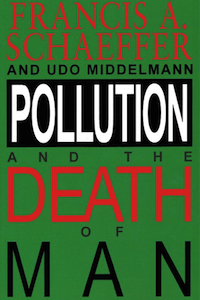 published in 1970 — yes you read that right! — now published by Crossway; $17.99.) It was more than a breath of fresh air, it gave vocabulary and Biblical basis for what I intuited and deeply believed. (I was involved in our small town in the very first Earth Day, after all, with one of the great, green ecology flags as our youth group picked up litter.) Although I’ve read better stuff since, Schaeffer was a p
published in 1970 — yes you read that right! — now published by Crossway; $17.99.) It was more than a breath of fresh air, it gave vocabulary and Biblical basis for what I intuited and deeply believed. (I was involved in our small town in the very first Earth Day, after all, with one of the great, green ecology flags as our youth group picked up litter.) Although I’ve read better stuff since, Schaeffer was a p
ioneer in evangelical creation theology, green living, inviting us to realize our solidarity with animals and all creation since we all have the same Creator. Yes, this conservative Calvinist said, the Catholic Saint Francis was correct: “brother son, sister moon” indeed.
And the other pivotal book — I will watch myself so as to not write pages and pages — was the small but potent Art and the Bible (IVP; $8.00.) It was published in 1972 and I think I read it in ’73. It included two sections, “Art in the Bible” and “Art and the Bible” and it made a simple, clear case that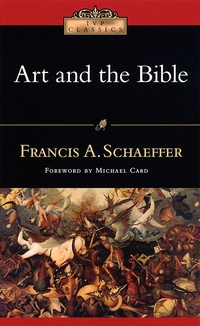 Christians should be aware of the influences of the art world, and be both critical and appreciative. We should have imaginations that fly beyond the stars — God desires what Cal Seerveld later called “rainbows for the fallen world.” He showed that ‘religious art’ does not have to be so overtly like propaganda, but should be creative, nuanced, allusive — and that the style should fit the theme, opening up great and yet coherent possibilities. The latest edition has a lovely forward by Michael Card. This book, again, gave us a framework and foundation for thinking about culture, literature, fiction, the arts — yes, yes, yes!
Christians should be aware of the influences of the art world, and be both critical and appreciative. We should have imaginations that fly beyond the stars — God desires what Cal Seerveld later called “rainbows for the fallen world.” He showed that ‘religious art’ does not have to be so overtly like propaganda, but should be creative, nuanced, allusive — and that the style should fit the theme, opening up great and yet coherent possibilities. The latest edition has a lovely forward by Michael Card. This book, again, gave us a framework and foundation for thinking about culture, literature, fiction, the arts — yes, yes, yes!
So, again, this is an important part of our story, part of why we do what we do, and — I guess this is fair to say — part of your story, now, too, if you buy books from us. We wouldn’t be here, I suspect, if it weren’t for God’s formational work in us through the writings of Francis Schaeffer. The mainline Protestantism of my youth didn’t quite get us there. The charismatic renewal and Jesus movement of the mid-70’s didn’t quite get us there. The religious right nor the religious left didn’t quite get us there. Schaeffer explicating that a Reformed worldview based on the Bible means “substantial healing” in all areas of life, and that the gospel’s call cuts across all zones of life, that is what provided a basis that allowed us to do this odd thing of trying to sell the kinds of books we do.
And believing there were others who wanted books relating faith and life in this sort of way.
Whether you realize it or not, then, Schaeffer matters to all of us in the H&M tribe.
FRANCIS SCHAEFFER
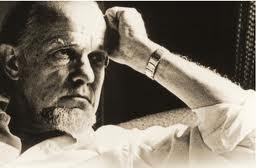 iddle of the fundamentalist-modernist controversies of the mid-20th Century left the US to start a drop-in center for spiritual seekers in Switzerland. His Swiss commune and study center was known as L’Abri, and by the late 1960s it had attracted scores of young adults who were critical of religion in the Western world, counter-cultural activists, and several famous seekers and celebrities, including a few well-known rock stars. Schaeffer grew in popularity, publishing dozens of books and working on two award-winning film series, documenting how historic, Biblical faith could be relevant for contemporary issues. Bill Edgar was one of those disenchanted young adults who made their way to the robust theological center in the Swiss Alps. As he explains in this great new book, it was Mr. Schaeffer himself who had the conversation with Edgar than led him to faith. Schaeffer on the Christian Life starts with a great chapter of Bill’s own reminiscences which frames the more detailed center part of the book. It ends, too, by the way, with another wonderfully personal chapter. I like that Bill is conversational throughout the book, but especially in the first and last chapters. It is very inspiring to learn about this through a first-hand take on the L’Abi ministry.
iddle of the fundamentalist-modernist controversies of the mid-20th Century left the US to start a drop-in center for spiritual seekers in Switzerland. His Swiss commune and study center was known as L’Abri, and by the late 1960s it had attracted scores of young adults who were critical of religion in the Western world, counter-cultural activists, and several famous seekers and celebrities, including a few well-known rock stars. Schaeffer grew in popularity, publishing dozens of books and working on two award-winning film series, documenting how historic, Biblical faith could be relevant for contemporary issues. Bill Edgar was one of those disenchanted young adults who made their way to the robust theological center in the Swiss Alps. As he explains in this great new book, it was Mr. Schaeffer himself who had the conversation with Edgar than led him to faith. Schaeffer on the Christian Life starts with a great chapter of Bill’s own reminiscences which frames the more detailed center part of the book. It ends, too, by the way, with another wonderfully personal chapter. I like that Bill is conversational throughout the book, but especially in the first and last chapters. It is very inspiring to learn about this through a first-hand take on the L’Abi ministry.
Here is a very nice review of the book and here is another brief summary — we are not alone in commending this as a great resource, important and interesting and relevant to your life.
The heart of the book explores Schaeffer’s unique, clear, gospel-centered approach to spiritual growth. As John Frame puts it, “Bill’s book focuses on the process we now call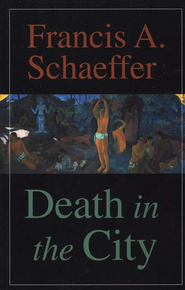 spiritual formation. The church can learn much from it. I commend this excellent book to all who see to draw nearer to God.” Yet, it is equally clear about Schaeffer’s whole-life vision and multi-faceted, culturally engaged ministry. It helps us put into context various aspects of, or topics within, Schaeffer’s body of writing. For instance, Edgar weighs in on what he thinks is the best place to start reading Schaeffer (it’s Death in the City, the study of Jeremiah) and names his personal favorite (Pollution and the Death of Man, in part because it emphasizes natural beauty; Edgar is a musician and very interested in art history, culture and aesthetics, so that makes sense.) There are, though, several core chapters which are a rather systematic exploration of Schaeffer’s classic True Spirituality (Tyndale; $13.99.) It is a key book for Schaeffer and Edgar notes that not much is made of it in the wide body of Schaeffer studies and biographies.
spiritual formation. The church can learn much from it. I commend this excellent book to all who see to draw nearer to God.” Yet, it is equally clear about Schaeffer’s whole-life vision and multi-faceted, culturally engaged ministry. It helps us put into context various aspects of, or topics within, Schaeffer’s body of writing. For instance, Edgar weighs in on what he thinks is the best place to start reading Schaeffer (it’s Death in the City, the study of Jeremiah) and names his personal favorite (Pollution and the Death of Man, in part because it emphasizes natural beauty; Edgar is a musician and very interested in art history, culture and aesthetics, so that makes sense.) There are, though, several core chapters which are a rather systematic exploration of Schaeffer’s classic True Spirituality (Tyndale; $13.99.) It is a key book for Schaeffer and Edgar notes that not much is made of it in the wide body of Schaeffer studies and biographies.
However, because there is so much of Bill’s own testimony, and his own overview of the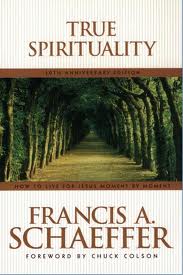 history and development of Schaeffer’s life and thought (not to mention the role of Schaeffer’s wife, Edith, who had her own large role to play at L’Abri and in Christian publishing) the book is not just a guide to True Spirituality. It does certainly include that, and it is helpful. It reminded me how good that book was, how it invited us to “moment by moment” faith reminiscent of Practicing the Presence of God but it also is so clear about the role of the cross in justification and sanctification that it seemed to me a precursor to the gospel-centered life material so popular in some Reformed circles. True Spirituality really is a book for our times, and in Edgar’s fine hands, its insights and guidance come alive, clear and well-organized and explicated for practical application.
history and development of Schaeffer’s life and thought (not to mention the role of Schaeffer’s wife, Edith, who had her own large role to play at L’Abri and in Christian publishing) the book is not just a guide to True Spirituality. It does certainly include that, and it is helpful. It reminded me how good that book was, how it invited us to “moment by moment” faith reminiscent of Practicing the Presence of God but it also is so clear about the role of the cross in justification and sanctification that it seemed to me a precursor to the gospel-centered life material so popular in some Reformed circles. True Spirituality really is a book for our times, and in Edgar’s fine hands, its insights and guidance come alive, clear and well-organized and explicated for practical application.
EDGAR, SCHAEFFER, AND WORLDVIEWISH APOLOGETICS OF THE HEART
Dr. William Edgar is, you should know, a well-respected, nationally-known Christian leader who has written several other books on apologetics and what we might call reflections on “reasons of the heart.” (That is, his philosophy of defending the faith and presenting the gospel to seekers and skeptics is not unlike Schaeffer’s, using evidences and natural logic, of course, but much more aimed at the presuppositions of one’s deepest worldview. For those who follow such things (forgive me if this is too arcane) Edgar stands in the grand tradition of Cornelius Van Til.
In fact, Edgar has recently re-edited and re-issued some of Van Til’s important work. It may be surprising,
but he also draws on the heady Dutch philosopher, Herman Dooyeweerd. He is not the first to note that Francis Schaeffer himself learned a lot about Dooyeweerd from one of his closest confidantes, the Dutch art critic and historian, Hans Rookmaaker. I am anxious to learn more about this connection, which is also explored in the magisterial, definitive biography of Schaeffer, Colin Duriez’s Francis Schaeffer: An Authentic Life (Crossway; $24.99.) Schaeffer was a lay philospher, and never formally studied art history, but he had a great love for art and art books (and film and classical music, and pop music, too.) Edgar tells some nice stories about these passions that were so very rare among conservative evangelicals in those days, especially. And some of his framework for understanding things came from Van Til and Dooyeweerd.
Again, that means his apologetic is more about persuasion than arguing, more about the history and implications of living rather than just piling up “proofs for the existence of God” and more about the heart than sheer logic. When Edgar isn’t writing books and playing jazz or gospel piano, he is a full time Professor of Apologetics, holding the prestigious Chair of Christian Apologetics at Westminster Theological Seminary. Here is the bio I gleaned and used in some PR for the upcoming lecture. I hope it shows you that he is a reliable scholar and well worth reading:
Edgar graduated from Harvard University, completing his doctorate at Universite de
Geneve in Switzerland. He has written several books for contemporary, thoughtful readers, inviting them to consider the reliability of the claims of classical Christianity and their relevance for contemporary life, art, and culture. Besides being a professor and author, Edgar is himself a musicologist and accomplished jazz pianist, whose album “Heaven in a Night Club” tells the story of the history of African American music in America, and suggests how blues, black gospel and jazz music can illustrate the history, injustices, and strengths of the US African American struggle for meaning.
By drawing on a close reading of Schaeffers most important books, and his own personal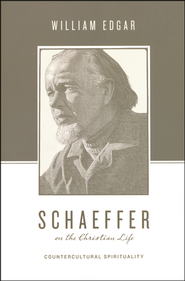 experience with the Schaeffer’s ministry at L’Abri, Schaeffer on the Christian Life: Countercultural Spirituality is both informative and insightful and, I suppose, in this age of often goofy spiritiuality, counter-cultural. He really does offer a third alternative to overly inward, mystical experiences, and overly heady, abstract notions. This is warm, human, Christ-centered, ordinary faith, lived out, from the inside out.
experience with the Schaeffer’s ministry at L’Abri, Schaeffer on the Christian Life: Countercultural Spirituality is both informative and insightful and, I suppose, in this age of often goofy spiritiuality, counter-cultural. He really does offer a third alternative to overly inward, mystical experiences, and overly heady, abstract notions. This is warm, human, Christ-centered, ordinary faith, lived out, from the inside out.
Schaeffer’s cultural insights are particularly urgent today as well when Christian churches and organizations are re-evaluating their social, cultural, and political influence. Schaeffer’s commitments to civil public theology and creative work for cultural renewal and the common good emerged from his profound inner life. This “countercultural spirituality” is a faith which Edgar explores — teaching us, through Schaeffer, how we too can return to a sane and yet powerful awareness of grace and the impact walking with the Lord can really have, day by day, in all we do (including our public and social lives.) It isn’t a manual or formula, though, which, again, illustrates its profundity; as wise contemporary writers such as Eugene Peterson would remind us, this is not about technique!
AWKWARD
I have written a bit about this before, and others have as well, but it is clear that Schaeffer was involved in the rise of the religious right in the mid 1980s, in part, encouraged in this by his son Frank (then known as Franky) in ways that struck many of us as unhelpful and inconsistent with his generous, nonpartisan earlier approaches. Many who knew L’Abri well have insisted that Frank Schaeffer’s retelling is not fair or accurate, but there is no denying that Schaeffer garnered a reputation for being involved in partisan politics and heavy anti-abortion activism with Jerry Falwell and the like. One ought not dismiss the fullest and best work of Francis and Schaeffer — their personal interest in real people, offering honest answers for honest questions, often through tears — just because one heard weird things about his politics or was frustrated by Schaeffer’s strident tone near the end. Edgar addresses this a bit and while it seems that Edgar shares some of Frank’s concerns about Francis’ involvement in the more extreme elements of the religious right, he is confident that Schaeffer’s body of work is enduring, and his spiritual insight profound. I think Schaeffer on the Christian Life: Countercultural Spirituality could be a good introduction, or a good refresher course, on the things that mattered most to Fran.
WANT AN AUTOGRAPHED COPY?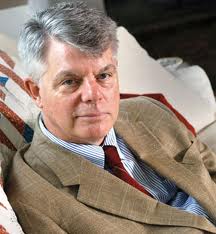 So, you may not be able to join us in Pittsburgh on Thursday, but you can order the book from us at a 20% discount. If you send us an email, we most likely can get an autographed copy for you, in fact — just let us know to whom you want it made out or if you just want an autograph. That would make it a very special gift, if you want to share it with someone.
So, you may not be able to join us in Pittsburgh on Thursday, but you can order the book from us at a 20% discount. If you send us an email, we most likely can get an autographed copy for you, in fact — just let us know to whom you want it made out or if you just want an autograph. That would make it a very special gift, if you want to share it with someone.
We will, of course, have all of Bill’s other books as well, including the great little Reasons of the Heart: Recovering Christian Persuasion (Presbyterian & Reformed; $12.99) and a new book of apologetics for teens, Your Questions, God’s Answers (Christian Focus; $15.99.)
Beth and I are eager to join our friends in the CCO for the event. You may recall that we lived in the Pittsburgh area in the 1970s and early 1980’s when we worked with them CCO; in those days it was known that the organization was influenced in decisive ways by the early writings of Francis Schaeffer.
Here is what was said in a press release: “We established the annual Hearts & Minds Summer Lectureship to honor the influence CCO has had in the academic community in Pittsburgh, by bringing in authors whose books address the confluence of faith, culture, and college life,” Borger said. “Last year, we launched an Oxford University Press release, a book exploring the history of Protestant engagement in film, Reforming Hollywood: How American Protestants Fought for Freedom at the Movies (Oxford University Press; $29.95) written by former CCO staff member William D. Romanowski, and this year’s event with Bill Edgar will be just as interesting and enjoyable. We think a wide audience will be eager to hear this 21st century reflection on the importance of Schaeffer’s significant work.”
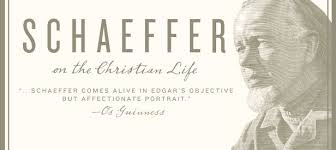
DISCOUNT
ANY ITEM MENTIONED
20% off
order here
takes you to the secure Hearts & Minds order form page
just tell us what you want
inquire here
if you have questions or need more information
just ask us what you want to know
Hearts & Minds 234 East Main Street Dallastown, PA 17313 717-246-3333
read@heartsandmindsbooks.com
